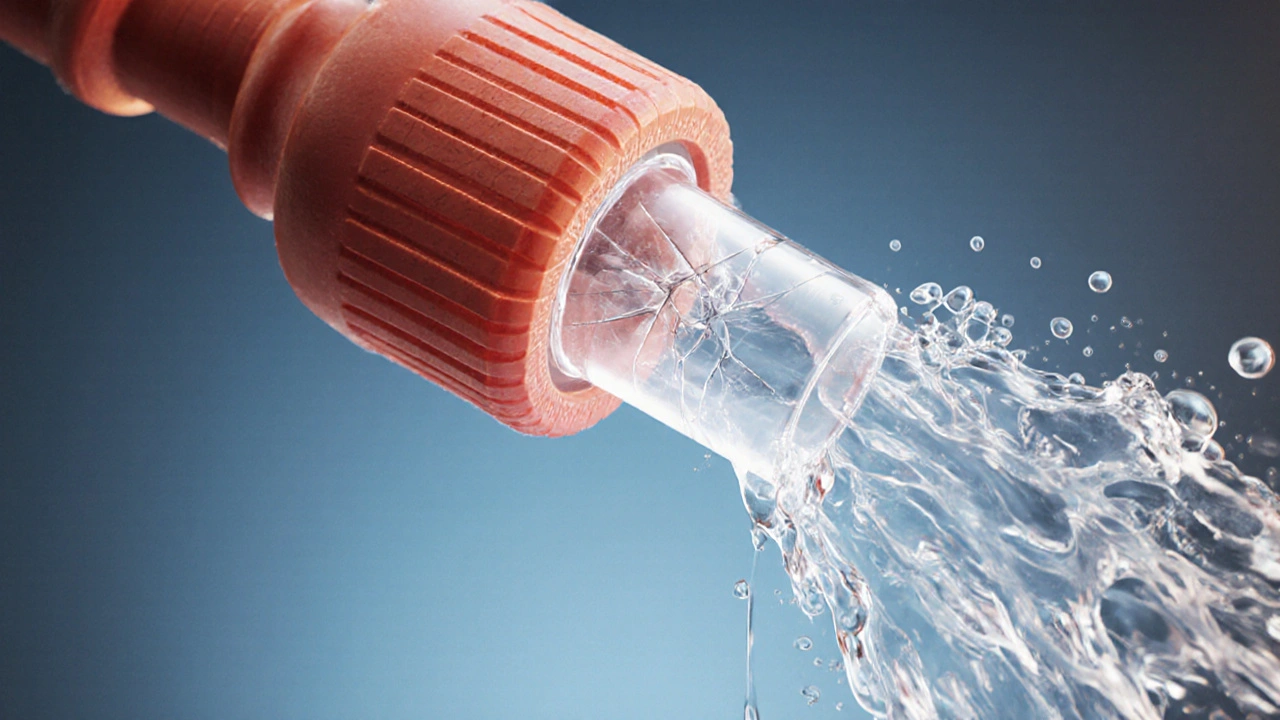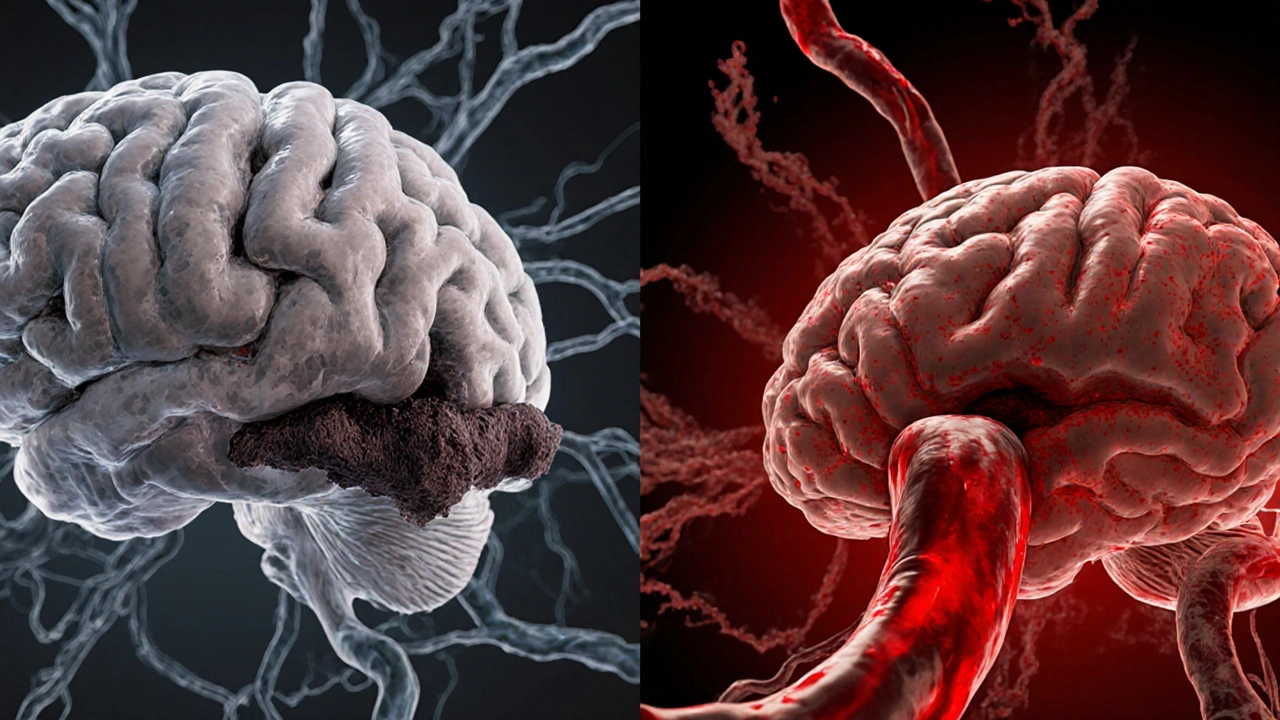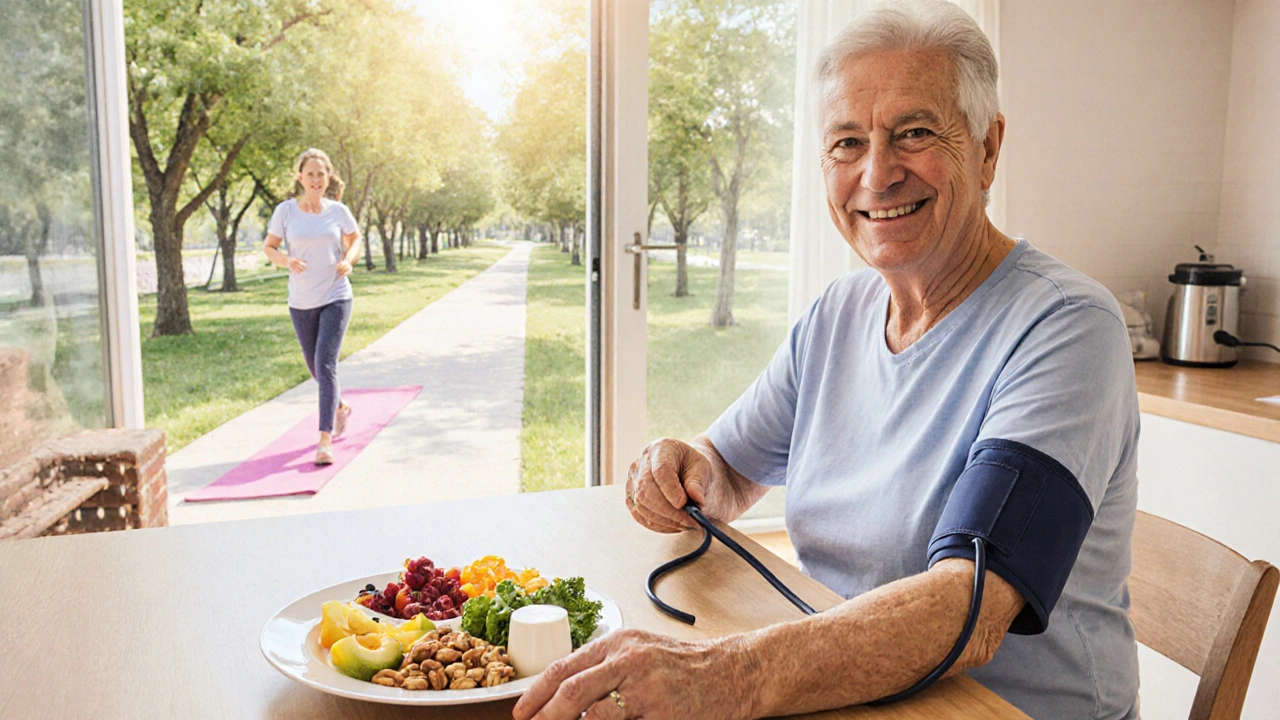How High Blood Pressure Increases Stroke Risk - What You Need to Know
 Oct, 12 2025
Oct, 12 2025
Blood Pressure Stroke Risk Calculator
High blood pressure significantly increases stroke risk. This tool calculates your stroke risk based on your blood pressure measurements and provides personalized advice for reducing your risk.
Quick Takeaways
- Hypertension roughly doubles the chance of having a stroke.
- Both ischemic and hemorrhagic strokes become more likely as blood pressure rises.
- Controlling systolic pressure below 130mmHg cuts stroke risk by up to 40%.
- Lifestyle tweaks - diet, activity, stress control - work alongside medication.
- Regular monitoring lets you spot dangerous spikes before they cause damage.
What Is High Blood Pressure?
When you hear the term high blood pressure is the medical condition where the force of blood against artery walls stays elevated over time, think of a garden hose left on full blast. The constant pressure can wear down the pipe, and in your body it can damage tiny vessels in the brain.
Doctors measure it with two numbers: systolic (the top number) shows pressure when the heart pumps, and diastolic (the bottom number) shows pressure when the heart rests. A reading of 130/80mmHg or higher is now considered hypertensive by most guidelines.
How Hypertension Hurts the Brain
Blood vessels in the brain are delicate. When you have hypertension the chronic stress on arterial walls leads to narrowing, stiffening, and tiny leaks. Over years, this can cause three key problems:
- Atherosclerosis: Fatty plaques build up, narrowing the lumen and making it easier for a clot to form.
- Arterial rupture: Extremely high spikes can burst a weakened vessel, causing bleeding.
- Reduced blood flow: Stiff vessels don’t expand enough, starving brain tissue of oxygen.
Each of these pathways can trigger a stroke, which is simply the brain not getting the blood (and oxygen) it needs.

Types of Stroke and the Role of Hypertension
There are two main stroke categories. Below is a quick side‑by‑side view of how high blood pressure feeds each type.
| Stroke Type | Primary Mechanism Linked to High Blood Pressure | Typical Outcomes |
|---|---|---|
| Ischemic | Blood clot forms on atherosclerotic plaque or travels from elsewhere (embolism) | Sudden weakness, speech trouble, often survivable with prompt treatment |
| Hemorrhagic | Rupture of a small artery weakened by chronic pressure | Rapid loss of consciousness, higher mortality rate |
Studies from the American Heart Association show that about 70% of strokes are ischemic, but hypertension raises the odds of a hemorrhagic event by 1.8‑fold compared with people whose blood pressure is normal.
Numbers That Matter
Here are the key stats from large‑scale cohort studies up to 2024:
- People with systolic pressure 140‑159mmHg have a 1.5× higher risk of stroke than those under 120mmHg.
- When systolic pressure climbs above 180mmHg, the risk spikes to 3‑4×.
- For every 10mmHg drop in systolic pressure, stroke risk falls by roughly 20%.
- Hypertensive patients who also have diabetes or high cholesterol face a combined stroke risk up to 3times higher.
These figures underscore why blood pressure is called the “silent killer” - you may feel fine, yet the damage is accumulating.
Taking Control: Lifestyle and Medications
Lowering your numbers isn’t a one‑size‑fits‑all plan. Most clinicians blend diet, activity, and meds.
Dietary tweaks
- Adopt the DASH diet - lots of fruits, veggies, low‑fat dairy, and limited sodium (under 1500mg/day).
- Swap processed snacks for nuts or berries; a handful of almonds supplies potassium, which balances sodium.
Physical activity
- Aim for 150 minutes of moderate‑intensity cardio each week (brisk walking, cycling).
- Resistance training twice weekly supports vascular health.
Stress management
- Mind‑body practices like deep breathing or yoga can shave a few mmHg off nightly readings.
Medication basics
When lifestyle isn’t enough, doctors prescribe classes such as:
- ACE inhibitors - relax blood vessels.
- Calcium channel blockers - reduce heart’s pumping force.
- Thiazide diuretics - help kidneys flush excess salt.
Choosing the right combo often depends on age, kidney function, and co‑existing conditions like diabetes high blood sugar that further damages blood vessels or high cholesterol excess LDL that fuels plaque buildup.

Monitoring and When to Seek Help
Home blood pressure cuffs are cheap and accurate if you follow the guidelines: sit quietly for five minutes, keep the cuff at heart level, and take two readings a minute apart.
If you notice any of these signs, call emergency services immediately:
- Sudden numbness on one side of the body.
- Severe headache with no known cause.
- Vision changes or trouble speaking.
These symptoms are classic for an acute stroke, and “time is brain”. Early treatment-clot‑busting drugs for ischemic stroke or surgery for hemorrhagic bleed- dramatically improves outcomes.
Next Steps for Anyone with High Blood Pressure
- Schedule a check‑up to get a baseline reading.
- Start a food diary for a week; cut salty snacks and add potassium‑rich foods.
- Pick a three‑day‑per‑week walk routine; track steps with a phone app.
- Discuss with your doctor whether a low‑dose ACE inhibitor is right for you.
- Set a reminder to measure your pressure every morning and log the numbers.
Following these actions can slash your stroke risk and keep your brain sharper for years.
Frequently Asked Questions
Can a single high reading cause a stroke?
A one‑time spike isn’t usually enough to trigger a stroke, but it signals that your vessels are under stress. Repeated spikes raise the long‑term risk, so it’s a warning to act quickly.
Is low blood pressure ever a problem for stroke prevention?
Very low pressure can cause dizziness and fainting, which might lead to a different type of brain injury, but it doesn’t increase stroke risk. The goal is a stable, moderate range.
Do all stroke survivors have hypertension?
Not all, but a majority do. Studies show that about 65‑70% of stroke patients had elevated blood pressure before the event.
Can quitting smoking lower my stroke risk even if I still have high blood pressure?
Absolutely. Smoking adds chemicals that speed up atherosclerosis. Quitting can cut stroke risk by up to 30% independent of blood‑pressure control.
Is there a genetic link between hypertension and stroke?
Yes. Families with a history of hypertension often carry gene variants that affect salt handling and arterial tone, making both high blood pressure and stroke more likely across generations.
Edwin Pennock
October 12, 2025 AT 03:13Blood pressure is no joke, keep an eye on it.
John McGuire
October 21, 2025 AT 09:27Wow, this guide really breaks down how scary hypertension can be 😲! The quick takeaways are spot on and the DASH diet tip is golden. If you’re feeling lazy, just remember a 30‑minute walk can shave off a few mmHg. Keep pushing, your brain will thank you later! 🚀
newsscribbles kunle
October 30, 2025 AT 14:40Let me set the record straight: the Western world has been fed sugary lies about blood pressure for decades, and the elites are counting on your ignorance to keep their pharma profits soaring. They hide the simple truth that a salt‑free diet and vigorous farming practices can slash stroke risk without a pill. While you’re busy clicking calculators, the real battle is against a system that glorifies processed foods. The statistics they quote are cherry‑picked from studies funded by drug companies, not independent research. You think lifestyle tips are enough? Ha! Only when the government stops subsidizing junk and you reclaim your ancestral eating habits. The “silent killer” narrative is a smokescreen to keep you dependent on medication. Your arteries deserve more than a daily dose of chemically induced relaxation; they need real, whole‑food nourishment. The article’s advice is solid, but it misses the larger political context that fuels hypertension epidemics. As a proud citizen, I demand transparency and a return to natural health practices. Stop trusting the glossy brochures and start demanding real change. The future of our brains hinges on breaking these chains of corporate greed.
Bernard Williams
November 8, 2025 AT 20:53Great rundown! If you’re above 130 mmHg, aim for the DASH diet: lots of fruits, veggies, low‑fat dairy, and keep sodium under 1500 mg. Pair that with 150 minutes of moderate cardio a week and you’ll see numbers drop. Monitoring at home every morning helps catch spikes early. Consider a low‑dose ACE inhibitor if lifestyle tweaks aren’t enough, but always discuss with your doc first.
Michelle Morrison
November 18, 2025 AT 03:07They don’t want you to know that the real cure is hidden in ancient herbal formulas, but the mainstream media keeps pushing pills. Trust no one who says diet alone is enough.
harold dixon
November 27, 2025 AT 09:20Thanks for the clear steps. I’ll start logging my meals and set a reminder for morning checks. Consistency is key.
Darrin Taylor
December 6, 2025 AT 15:33Sure, meds are overhyped; most people could just walk more and eat carrots. The industry loves you to be dependent.
Anthony MEMENTO
December 15, 2025 AT 21:47Actually the optimal systolic is under 120 mmHg and the data is crystal clear.
aishwarya venu
December 25, 2025 AT 04:00Love the positivity! Small steps like swapping chips for nuts can make a huge difference over time. Keep encouraging each other!
Nicole Koshen
January 3, 2026 AT 10:13The article is well‑structured, but watch out for missing commas after introductory phrases; they improve readability.
Ed Norton
January 12, 2026 AT 16:27Solid info, thanks.
Karen Misakyan
January 21, 2026 AT 22:40In consideration of the presented data, one must acknowledge the paramount significance of vascular homeostasis in cerebral integrity.
Amy Robbins
January 31, 2026 AT 04:53Oh great, another post telling us to eat salad and take pills – exactly what the world needed.
Shriniwas Kumar
February 9, 2026 AT 11:07From a South Asian perspective, incorporating turmeric and fenugreek into the diet provides both anti‑inflammatory and antihypertensive benefits, bridging traditional wisdom with modern guidelines.
Jennifer Haupt
February 17, 2026 AT 02:13Reflecting on the interplay between physiological pressure and existential freedom, we recognize that mastering our blood pressure becomes a metaphor for mastering our destiny.